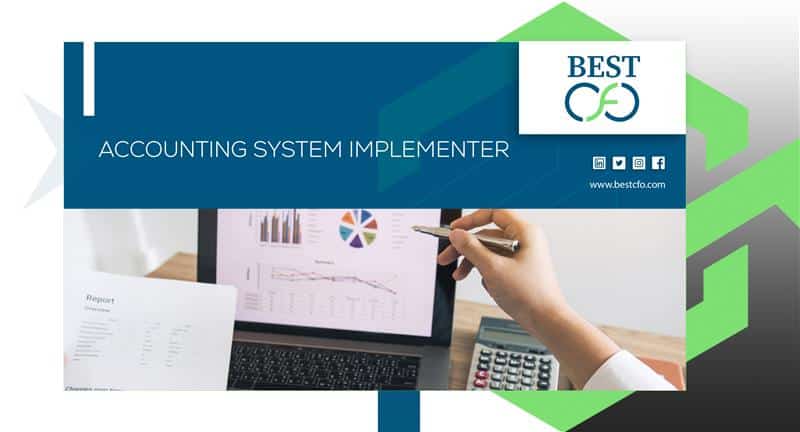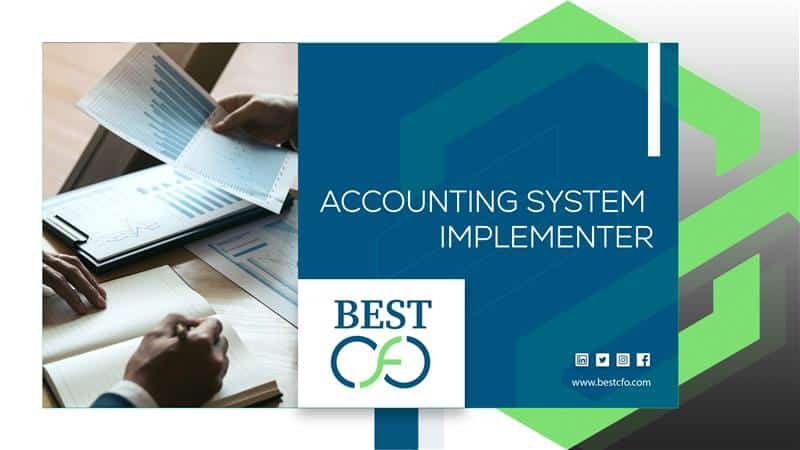
| Getting your Trinity Audio player ready... |
Top Accounting System Implementer – QuickBooks & More
Choosing the right accounting software is one of the most important decisions for any business — whether you’re just starting out or rising rapidly. But getting the software is only half the job. Setting it up correctly, combining it with your systems, and training your team? That’s where an accounting system implementer steps in.
An accounting system implementer doesn’t just install software — they enable you build a smooth and dependable financial basis. They make sure your setup is precise, efficient, and ready to grow with you. Whether you’re leaning toward QuickBooks or considering other options like Xero or NetSuite, the services of a skilled implementer can save you time, money, and future headaches.
This blog dives into who implementers are, the value they bring, why QuickBooks is so widely used, and which alternatives might suit your business better.
What Is an Accounting System Implementer?
An Accounting System Implementer is a professional who helps businesses successfully install and set up accounting software. They’re like a guide who knows the technology inside out and ensures you get the most out of it.
They don’t just plug in the software and walk away. Instead, they offer:
- Consulting: Understanding your business needs and recommending the best tools.
- Customization: Tailoring the software to match your workflows.
- Training: Teaching your team how to use the system correctly.
- Integration: Connecting accounting tools with systems like payroll, CRM, or eCommerce platforms.
Their key responsibilities often include:
- Data migration: Moving your data safely from old systems or spreadsheets.
- Workflow automation: Setting up rules to handle tasks like invoicing or reporting automatically.
- Compliance checks: Ensuring your setup aligns with tax laws and financial regulations.
Benefits of Professional Implementation
Hiring a pro to implement your accounting software comes with serious perks:
Accuracy
Manual mistakes in bookkeeping can cost you money and stress. Implementers ensure your setup is clean and correct from the beginning, reducing room for error.
Efficiency
No more wasting hours doing tasks by hand. Automations like recurring invoices, payroll, and bank reconciliations save you time and keep your books up to date.
Scalability
A good implementation means your accounting software grows with you. Need to add users? Expand to new markets? Accept multiple currencies? No problem — your system is ready.
Compliance
Tax rules and financial reporting standards can be tricky. Implementers make sure your system meets all legal requirements, helping you avoid penalties.
When Do You Need an Implementer?
Not every business needs an implementer from day one — but many do at some point. Here’s when you should consider bringing in an Accounting System Implementer:
- Startups: Starting fresh? A solid setup from the beginning sets the tone for smart finances.
- Established businesses: If your current system is messy, outdated, or overly manual, it’s time for an upgrade.
- Complex industries: Retail, manufacturing, and eCommerce companies often have unique needs like inventory management or sales tax tracking.
- Multi-currency or multi-location operations: Running a global business or multiple branches? You’ll need an implementer to ensure smooth financial operations.
QuickBooks – The Leading Accounting Software
Why QuickBooks Dominates the Market
QuickBooks is the go-to accounting software for small and medium-sized businesses. Why? It’s powerful, easy to use, and flexible.
Here’s what makes QuickBooks stand out:
- Invoicing: Create, customize, and send invoices in minutes.
- Expense tracking: Easily record bills, receipts, and purchases.
- Inventory management: Track stock levels and get alerts when supplies run low.
- Payroll: Handle employee pay, tax filings, and benefits all in one place.
Its strong market presence, user-friendly interface, and variety of plans make it an ideal fit for many industries.
QuickBooks Implementation Process
A good QuickBooks implementation is broken into clear steps:
Step 1: Assessment
First, the implementer learns about your business. What industry are you in? What do you need from your accounting software? This step ensures your setup meets your real-world needs.
Step 2: Setup & Customization
Next comes the core setup: your chart of accounts, tax rates, users, and key integrations (like Shopify, Stripe, or PayPal). Everything is tailored to your business.
Step 3: Data Migration
Time to bring in your historical data. Implementers help you import spreadsheets or move information from your old system without errors or missing details.
Step 4: Training & Support
Once everything’s running, your team gets trained. Need help later? Many implementers offer ongoing support so you’re never left in the dark.

Choosing a QuickBooks Implementer
When selecting a QuickBooks expert, look for:
- Certified ProAdvisors: These are implementers trained and approved by Intuit.
- Industry specialization: Whether you’re in retail, construction, or consulting, choose someone who understands your space.
- Ongoing support: Ask if they offer post-implementation help, updates, or troubleshooting.
Top Alternatives to QuickBooks
Not every business is a perfect match for QuickBooks. Here are some solid alternatives — and when they make sense.
Xero – Best for Multi-User Access
Key Features:
- Unlimited users
- Gusto payroll integration
- Multi-currency support
Ideal for teams that need shared access. The setup is cloud-based with smooth bank reconciliation tools.
FreshBooks – Best for Freelancers & Service Businesses
Key Features:
- Time tracking
- Client invoicing
- Expense management
It’s simple and mobile-friendly — perfect for solo workers or small teams.
Zoho Books – Best for Zoho Ecosystem Users
Key Features:
- CRM integration
- Inventory tracking
- Customizable reports
If you already use Zoho CRM or Zoho Projects, this is a seamless fit.
Sage Intacct – Best for Mid-Sized Businesses
Key Features:
- Advanced financial reporting
- Revenue recognition
- ERP capabilities
It offers deep customization and fits businesses with more complex financial needs, like SaaS companies or nonprofits.
NetSuite – Best for Enterprise-Level Businesses
Key Features:
- Full ERP platform
- Global compliance
- Real-time financial analytics
Great for large companies managing multiple subsidiaries or working across countries.
How to Choose the Right Implementer
Key Selection Criteria
The right implementer will feel like a trusted partner. Look for:
- Certifications & Experience: For example, QuickBooks ProAdvisors or Xero-certified consultants.
- Industry Expertise: Choose someone who knows your field. Retail accounting needs are different from healthcare or construction.
- Client Reviews & Case Studies: Ask for examples of their past work with businesses like yours.
Cost Considerations
Implementation isn’t free — but it should pay off.
- Pricing Models: Some implementers charge hourly; others offer fixed-fee packages.
- ROI Analysis: Think long term — automation, fewer errors, and better reports can all save time and money.
Future Trends in Accounting Implementation
The accounting world is changing fast. Here’s what to expect in the near future:
- AI & Automation: Chatbots and AI tools will handle more bookkeeping tasks in real-time.
- Blockchain for Security: This tech can help prevent fraud by locking down financial transactions.
- Cloud-Based Solutions: More companies are moving to systems you can access anytime, anywhere — perfect for remote teams.
Conclusion
Working with an experienced Accounting System Implementer is one of the smartest investments you can make for your business. Whether you’re launching QuickBooks, switching to Zoho, or upgrading to NetSuite, the right setup helps you stay compliant, boost efficiency, and scale with confidence.
Need help picking or implementing the best tool? Reach out to the experts at Best CFO — where smart accounting meets tailored business solutions.
FAQs
1: What does an accounting system implementer do?
They help businesses set up, customize, and maintain accounting software like QuickBooks, Xero, or NetSuite.
2: Do small businesses need an implementer?
Yes — especially if you want accurate setup, smooth integrations, and fewer future headaches.
3: How long does it take to implement an accounting system?
It depends on the software and complexity, but most setups take 1 to 4 weeks.
4: Can I switch from one accounting software to another?
Yes, and an implementer will help you migrate data safely and set up the new system.
5: What’s the cost of hiring an accounting system implementer?
Prices vary. Some charge hourly, while others offer packages. Always ask for a quote and breakdown.
Previous Post
Already Have a Loan? How You Can Get a Second Title Loan
Post a comment Cancel reply
Related Posts
Do I Need An Accountant As A Sole Trader?
Do I Need An Accountant As A Sole Trader? Are you a sole trader running…
Fractional Finance 101: Unlocking the Power of Micro-Investing
Fractional Finance 101: Unlocking the Power of Micro-Investing Have you ever looked at the price…
Cash or Accrual Accounting: Which One Should You Use?
Cash or Accrual Accounting: Which One Should You Use? Many businesses have a choice between…
Already Have a Loan? How You Can Get a Second Title Loan
Already Have a Loan? How You Can Get a Second Title Loan If you’re already…
 Demos
Demos  Colors
Colors  Docs
Docs  Support
Support 














